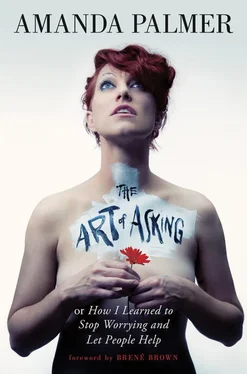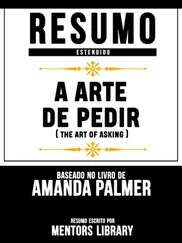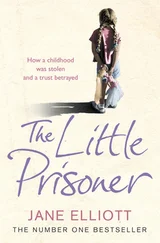I don’t necessarily believe there is a cure for this
So I might join your century but only as a doubtful guest
I was too precarious removed as a caesarian
Behold the world’s worst accident
I AM THE GIRL ANACHRONISM
—from
The Dresden Dolls , 2003
So I started a band.
And we were loud.
We had no guitars; it was just me on the piano and the microphone and Brian Viglione, who stumbled into my life like a long-lost musical soul-twin, on the drums. Our minimal setup didn’t limit our sonic power in the slightest: the drums alone deafened people, and I cranked my electronic piano to match. Brian had been reared on a steady diet of metal, jazz, and hardcore punk, and he hit the drums like a smoke-choked victim pounding on the exit door of a burning building; for him, commitment to the religion of drumming was his gateway to redemption. And I played piano the same way, seeking salvation through volume.
I met Brian during a Halloween party I threw at the Cloud Club. A few hundred people in costume were packed into the house, roving around all four floors. I’d been so busy organizing the party that I’d taken the lazy route and dressed as a temporary office worker in the two-piece suit my mother had insisted on buying me “for job interviews,” which had been stuffed in a paper bag unironically marked “grown-up clothes” in the back of my closet for more than four years. Brian came as a severed head, dressed all in black with convincing-looking blood oozing down his neck.
Late that night, on the ancient upright piano, I played and sang four of my closeted songs to a small, drunk crowd of friends. Brian took me aside and declared: I am destined to be your drummer . I didn’t argue. I’d been trying to start a band and was heading towards my twenty-fifth birthday, the deadline I’d superstitiously given myself to get my musical shit together or else face the inevitability of being a Total Failure.
We formed the band a week later and called ourselves The Dresden Dolls, in a nod to Kurt Vonnegut’s account of the Dresden bombing in Slaughterhouse-Five and the innocent, delicate porcelain figurines I always imagined strewn under the rubble of the decimated city. Dark, light, dark. That was us.
My sweet and patient mother had taught me piano basics and encouraged me to take lessons, to which I reluctantly trudged. I hated practicing and I found it incredibly frustrating to sight-read music off the page—as I still do—but I could figure out how to play anything I heard on the radio. I’d been amassing a pile of hypomanic songs for the piano since I was twelve, recording them into tape recorders and scribbling lyrics into notebooks in almost total privacy. Until I met Brian, I’d been a repressed performer of my own music, only venturing out once or twice a year to timidly share my not-so-timid songs with a live audience in a café, at an open mic night, at a party. My early teenage lyrics reflected and copied the music I loved: musical theater, The Beatles, New Wave—my songs were confessional and dark, drawing mostly from my confounded struggle to understand myself. I also wrote satirical songs about Starbucks. I couldn’t handle any criticism, no matter how well-intentioned, and sharing my songs or playing live simply terrified me, since any rejection of the material felt like a direct rejection of me .
But now I was free to unleash my massive back catalog of unheard material onto Brian on the top floor of the Cloud Club, where Lee allowed us (of course) to rehearse for free. Brian sat at his drums and listened intently as I shared each song, and, without an ounce of judgment regarding the hyper-personal lyrical content, he orchestrated pounding, delicate, symphonic drum parts. Everything he did was perfect. One by one, I played Brian every song I’d ever written; we kept the best, we ditched the rest. We booked our first gig in a friend’s art gallery.
Along with some thrown-together vintage costumes (to my delight, Brian loved to cross-dress) and our soon-to-be-signature white face paint (to my extreme delight, he loved wearing stage makeup), we had a magic chemistry that ambushed people with the sheer magnitude of our sincerity to emote. I was ecstatic. After spending half my life all but alone with a pile of weird little songs, I’d found a comrade, an outlet.
• • •
Date Neil Gaiman. Date Neil Gaiman The Writer . Date Neil Gaiman The Writer?
Why not? I figured I’d try.
Though I was nursing a broken heart from my last breakup, and he was still recovering from his, along with the shadowy aftershocks of his divorce, we edged towards each other, day by day, like two cautious but wounded animals, and started to poke experimentally at each other’s hearts, opening up little doors one at a time. It was slow, self-conscious work; we both knew how damaged we were. At least we could joke about it. And bit by bit, we started to fall in love.
It wasn’t a plummet to the bottom of the love well, which was the only way I’d experienced falling in love. I was used to relationships going from Hi! to Fuck Me! to Fuck You! in under three weeks. Those relationships tended to slam into painful realities when the initial rush was over. This one was different: it was more like that moment in Wonderland when Alice’s dress poufs out like a parachute and she floats down to the bottom of the well like a delicate feather.
One thing, however, I just couldn’t shake. I could deal with the fact that Neil was famous. I was famous, too, in my own small, indie-rock way. But rich? I was struggling with that one. I made plenty of money when I toured, but I spent every penny on my recordings, my road crew, and my office staff. I had no savings and barely owned anything at that point: no car, no real estate, no kitchen appliances. I owned a lot of books, records, and T-shirts. My net worth was roughly equivalent to the cost of the grand piano I’d bought for $15,000 when I finally signed a recording contract. My rent was $750 a month. Neil owned multiple houses.
To make things worse, I couldn’t talk to anyone about how weird it felt. I mean, I talked to everyone about it—my close friends, my intimates, my touring mates—but none of them was in a similar position, and they couldn’t really advise me. Plus, complaining to my broke-ass artist friends about how to adjust to dating a rich guy felt like it was in particularly poor taste. I needed someone to ask who I knew was in the same boat. I tried to figure out who that might be.
Kathleen Hanna. Singer of Bikini Kill, the seminal Riot Grrl band. She would know. She was a punk feminist icon who was used to being embroiled in controversy, cutting records, and touring; cult famous but never famous enough to fill a stadium. Like me, she’d spent years just working her ass off on her bands and projects, but had never been rich. Then she’d married Ad-Rock from the Beastie Boys, who had achieved stadium-sized success. From afar, they seemed really happy. I didn’t know her, but I tracked down her email address and wrote her:
Hi. It’s Amanda Palmer from The Dresden Dolls. I know you don’t really know me, but I need to ask you for advice. It’s a phone call, not an email .
She called me.
Honestly, Amanda? she said. For a while it just sort of sucked. There was a month when I was so broke I barely had enough money for food. And I was dating Adam and crashing in his swank apartment in Manhattan while he was away on tour, and I was, like, scraping together money to walk to the corner and buy instant noodles and oatmeal. It was really weird. And the thing that sucked most of all was not being able to talk to anyone about it .
Читать дальше












